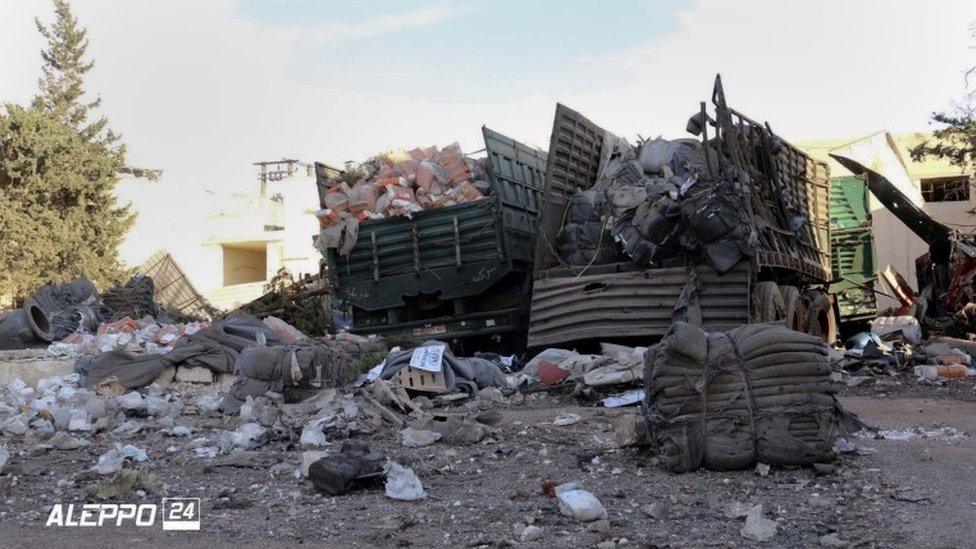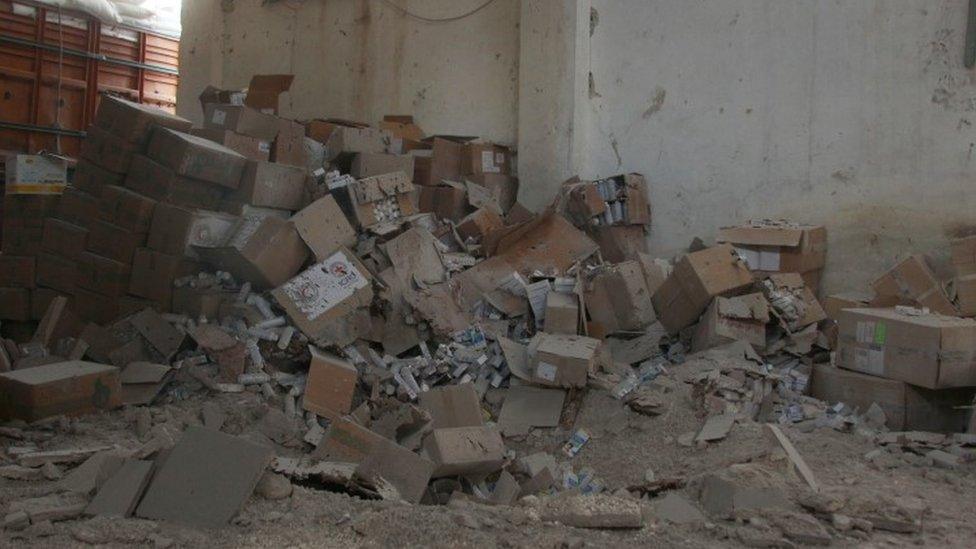Syria conflict: UN suspends all aid after convoy hit
- Published
Syrian activist: 'Helicopter dropped bombs on aid convoy'
The UN has suspended all aid convoys in Syria after a devastating attack on its lorries near Aleppo on Monday.
The strikes, which witnesses say came from the air, came hours after Syria declared a week-old US-Russia brokered cessation of hostilities at an end.
Russia and Syria have both insisted that their forces were not involved.
But UN chief Ban Ki-moon launched a stinging attack on the Syrian government, saying it had killed the most civilians in the civil war.
In unusually blunt language, Mr Ban said "powerful patrons... feeding the war machine, also have blood on their hands".
US Secretary of State John Kerry, speaking alongside his Russian counterpart Sergei Lavrov, insisted the ceasefire deal was "not dead", following talks on the sidelines of the UN General Assembly on New York on Tuesday.
UN Syria envoy Staffan de Mistura also said there was still hope but said delegates from the Syria Support Group had agreed the truce deal was in danger.
A member of the Syria Civil Defence, also known as the White Helmets, describes the aftermath of the attack on an aid convoy in Urum al-Kubra
The attack at Urum al-Kubra destroyed 18 of 31 lorries and killed about 20 civilians, including a senior local official of the Syrian Arab Red Crescent, named as Omar Barakat.
The UN would not confirm what type of attack took place, saying "we are not in a position to determine whether these were in fact air strikes".
Russian defence ministry spokesman Igor Konashenkov said that after studying video taken at the scene they "did not find any signs of munitions hitting the convoy".
"Everything shown in the video is the direct result of a fire which mysteriously began at the same time as a large scale rebel attack on Aleppo," he said.
The Syrian military, quoted by state media, said there was "no truth" to reports that the army had targeted the convoy.
The Syrian Red Crescent says people "were well aware' of location of attacked aid convoy
The Syrian opposition, meanwhile, hit out at the international community for not taking action against the Syrian government for ending the ceasefire.
Riad Hijab, general co-ordinator of the main umbrella group the High Negotiation Committee, said the opposition had proof Russia and Syria were behind the convoy attack, but did not give details.
A media activist who witnessed the attack told the BBC Arabic service that Russian reconnaissance planes had been spotted, apparently filming the passage of the convoy.
He said the first strike came at about 19:00 local time on Monday, when a helicopter dropped several barrel bombs. This was followed by rocket and machine-gun fire from aircraft, he said.

Aid workers in shock: Imogen Foulkes, BBC News, Geneva
Just a day ago, aid workers in Geneva were "almost celebrating" one said, because all the necessary permits had been received, all the warring parties had been notified, and a convoy was finally going to Aleppo province.
The 31 lorries were carrying supplies for 78,000 people in Urum al-Kubra. But this morning, the optimistic mood had changed.
Aid workers familiar with some of the world's most brutal conflicts were in shock, some close to tears, others expressed disgust. Vitamins and blankets, books and pencils for children, medicines to treat burns or diabetes have all been destroyed.
The head of the Syrian Arab Red Crescent's office in Urum was killed, dying of his injuries as he waited hours to be evacuated. Now the UN and the Red Cross have suspended aid deliveries. Millions of Syrians who had hoped the brief ceasefire might bring some relief will, a Red Cross spokesman said, go on suffering, "and they have been for years".

Ban Ki-moon, in his final address as UN Secretary-General to the UN General Assembly in New York, said many groups had killed innocents in Syria "but none more so than the government of Syria, which continues to barrel-bomb neighbourhoods and systematically torture thousands of detainees".
He called the attack on the aid convoy "sickening, savage and apparently deliberate" and called for those responsible to be held to account.
Aid worker Stephen Ryan says his organisation is in shock following the attack
A UN spokesman said earlier that the convoy had received proper permits, and all warring parties - including Russia and the US - had been notified.
The President of the International Committee of the Red Cross, Peter Maurer, denounced the attack as a "flagrant violation of international humanitarian law" and said it could amount to a war crime.
Syrian Red Crescent President Abdulrahman Attar said: "It is totally unacceptable that our staff and volunteers continue to pay such a high price because of the ongoing fighting."
The US expressed "outrage" over the attack. Washington said it would "reassess the future prospects for co-operation" with Russia - an ally of Syria's government.
Aid deliveries to besieged areas had been a key part of the cessation of hostilities deal brokered last week.
An Aleppo resident spoke to Newsday amid airstrikes and gunfire
The convoy was being unloaded at a Red Crescent warehouse when the attack began. The warehouse and a nearby health clinic were also badly damaged.
The Syrian military and rebels have accused each other of widespread violations.

The attack on the convoy left aid supplies damaged beyond use and strewn over the ground

Boxes of medical supplies were destroyed, shortly after unloading
The UK's former international development secretary, Andrew Mitchell, says the attack could be a war crime
